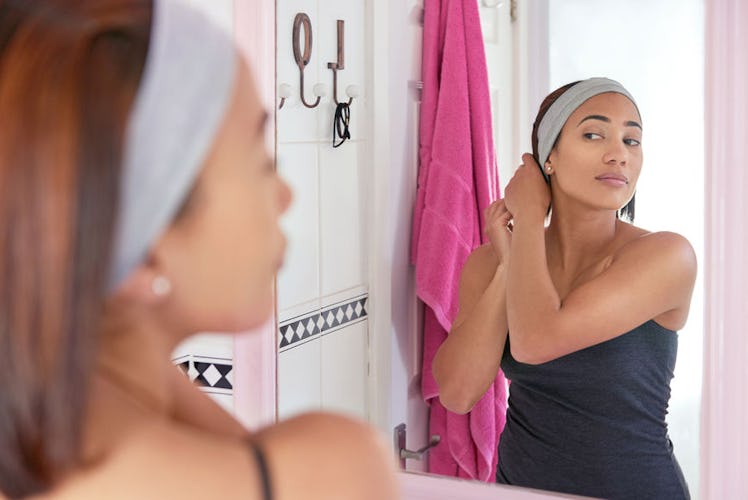
People On TV Use This Hack For Anxiety All The Time & It's Actually Backed By Science
The moments in which you experience a wave of genuine anxiety can almost make you feel like you’re boiling over. I know myself, and when I start to get worked up, it’s like my nervous system lights a fire in my belly: My cheeks grow hot and rosy, and I’ll try a number of ways to cool down, like throwing my hair up in a ponytail, or washing my face. But here’s the thing: Does splashing water on your face really calm you down? Riverdale actress Lili Reinhart recently threw the question out into the Twitter universe, naturally sparking a conversation about whether or not the anxiety hack is actually legit, or just something people do in movies for dramatic effect. Lo and behold, science says the strategy is the real deal.
Think of it this way: How do you put out a fire? You throw water on it. So, in theory, splashing water on your face to cool down when you’re literally and figuratively heating up makes a lot of sense, right? But I totally see where Reinhart was coming from when she posted a tweet over the weekend asking if people actually race into the bathroom, flick on the first faucet they see, cup their hands under the tap, and splash water on their face to calm themselves down. Sure, it looks effective on camera, but don’t forget, it's all part of a script, and as soon as the director yells "cut," hair and makeup are at the actor's side in a millisecond to spruce them up.
So is this actually a thing people do regardless of where they are when anxiety takes over, or was this hack exclusively made for Hollywood? Twitter was pretty divided on the subject when Reinhart posed the question.
But even though Twitter responses went back and forth over whether or not people actually use this trick IRL, Robert Glatter, M.D., assistant professor of emergency medicine at Lenox Hill Hospital, Northwell Health, tells Elite Daily that splashing cold water on your face — otherwise known as cold water immersion — is a legitimate tactic you can use to calm yourself down when you're experiencing anxiety. It’s made to look super dramatic, and maybe even a little unnecessary in TV shows and movies, but Glatter says the simple strategy can have a significant impact on your body’s physiological response to anxiety and stress.
So aside from potentially messing up your makeup and dampening the random pieces of hair that fly in your face, the effects of splashing cold water on yourself are actually pretty scientific (not to mention just generally fascinating). According to Glatter, the cool sensation of the water stimulates the parasympathetic nervous system, aka the part of your nervous system that controls bodily functions and helps you relax. When you’re anxious, Glatter explains, the sympathetic system triggers your body’s fight or flight mode, elevating your heart rate and blood pressure, and the point of splashing water on your face, he says, is to combat this reaction by lowering your heart rate.
Splashing water on your face is basically a shock to your system, adds Dr. Danielle Forshee, LLC, a psychologist based in New York and New Jersey. “When you are experiencing significant anxiety or panic, your heart rate increases and pumps blood much more quickly through your body to prepare you to fight or flight,” she tells Elite Daily over email. Introducing the cold water to your skin, she explains, acts as a shock at first, but quickly encourages the body to, in a sense, chill or be chilled.
If you consider yourself a water bug — you know, the type of person who could spend hours in the pool, rather than just lounging by one — the next time you’re feeling particularly anxious, you could consider a cold shower, or diving into a chilly pool. In fact, a 2013 study published in the American Physiological Society journal Physiology found that humans have what’s called a mammalian diving response, which means, when you submerge yourself in water, your body reacts almost instantaneously by slowing your heart rate, Bustle reports. Go big or go home, I guess?
Of course, if you're at work or school and aren't willing to risk running your mascara, diaphragmatic breathing exercises have very similar calming effects on the body, too. But it's always helpful to know all of your options, right?